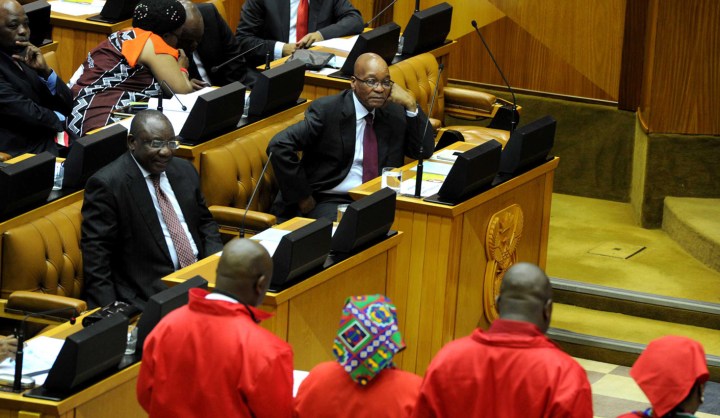South Africa
Op-Ed: Parliament – more at stake than EFF conduct

South Africans fought hard for the rule of law to prevail. Now they must preserve and defend it. By RAYMOND SUTTNER.
Much has been made of last week’s drama in which unprecedented scenes erupted in Parliament after President Jacob Zuma would not answer questions from Economic Freedom Fighter MPs about his response to the Public Protector (PP)’s report on Nkandla. The EFF has been berated for its behaviour, but is this the most important consideration?
The PP found the president was unlawfully enriched through upgrades to his Nkandla estate and that he should pay back a reasonable portion of this expenditure. Instead, Zuma commissioned other reports from bodies not enjoying the PP’s Constitutional status and declined to respond to the PP’s recommendations.
On being questioned by EFF leader, Julius Malema, the president refused to further address the findings or to say whether he would pay back any money.
The Speaker in turn did not press Zuma to provide more information then, or at a later date, as he is still Constitutionally required to do. Matters escalated. Parliament was thrown into disarray with EFF chants of “pay back the money!” and the Public Order police unit were summoned to eject the EFF, though this was not done.
Constitutionally, Chapter 9 institutions including the PP are independent, but rely on cooperation with the legislature and executive to have their recommendations implemented.
This relates to a key function of Parliament: to hold the executive accountable for what they do or fail to do (Sections 55(2)(a) read with section 92 (2) of the Constitution).
How does this square with “party loyalty?”
When MPs are elected to serve they are expected to carry out the policies of their party and to ensure collectively that all its MPs do so. In that sense there is a limit to the independence of any MP. They are not free agents under a proportional representation “list” or constituency system. They are bound to follow the “party line” and vote in accordance with the policies of their party, as interpreted at the time by its authoritative structures.
That partisanship is inherent in Parliamentary politics. An MP who discovers s/he cannot advance the policies of her or his party must resign.
There have been exceptional cases where, due to issues of conscience – for example, termination of pregnancy – the ANC allowed its members to absent themselves when a vote was taken.
But where there is no such agreement party members must abide by the decision of their caucus or leadership. This is how Parliamentary democracies operate all over the world.
But there is a higher, countervailing authority in South Africa. Whatever ministers or other leaders may require of MPs must be within the provisions of the Constitution. Parliament has a legal duty, beyond what the president or ministers may wish, and that is to hold the executive accountable.
To exact accountability is not a partisan choice determined by affiliation to one or other party, but a Constitutional requirement independent of belonging or not belonging to a party.
Thus, when a member of government performs or fails to perform tasks in execution of his or her duty there is a Constitutional obligation to hold the person accountable for what is or is not done.
This is required not only of opposition parties but of Parliament as a whole. MPs must ensure government officials perform their duties and incur expenditure in accordance with the Constitution and legality.
Yet we have seen Zuma repeatedly and illegally evading accountability, refusing to answer questions about spending and his actions, thereby withholding information he is Constitutionally obliged to supply.
The EFF’s Parliamentary question about Nkandla was preceded by a Constitutionally binding finding of the PP.
In such situations Parliamentary representatives, including MPs and the Speaker have a duty that supersedes party loyalties. That duty does not derive from party leaders, nor can they remove it.
To be instructed to protect the president from questioning or to connive in his evading his Constitutional duties is against the oath of office sworn by MPs and the duties of the Speaker. It is to substantively undermine Constitutionalism.
This is the framework in which the EFF sought their answer. When the president failed to provide information legally required by both the PP and the National Assembly, the Speaker had options other than to suppress the EFF. She could have asked the president to report fully at a later date or to provide some formulation acknowledging accountability. Yet she chose to shut down all discussion.
There is a disturbing disrespect being shown for legality in current politics, not only by the ANC but also in DA-ruled areas, as evident in the mainly unreported illegal evictions undertaken in Philippi last week. The rule of law is a hard-won freedom. It needs to be defended against all such attacks. DM
Professor Raymond Suttner, attached to Rhodes University and UNISA, is an analyst on current political questions and leadership issues. He writes a regular column and is interviewed weekly on Creamer Media’s Polity.org.za. Suttner is a former political prisoner and was in the leadership of the ANC-led alliance in the 1990s. He blogs at raymondsuttner.com. His twitter handle is @raymondsuttner
[This article first appeared on Creamer Media’s website: polity.org.za]
Photo: President Jacob Zuma watches as Economic Freedom Fighters leader Julius Malema and his party members take the Oath of Office wearing red workers’ overalls during the swearing in of MP’s as South Africa’s fifth Parliament convenes for the first time in Cape Town on Wednesday, 21 May 2014. Picture: GCIS/SAPA


















 Become an Insider
Become an Insider